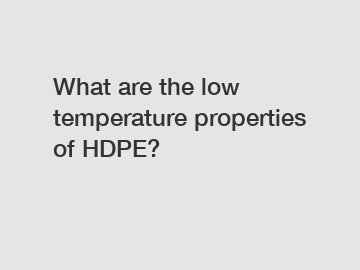What are the low temperature properties of HDPE?
As one of the most commonly used plastics in the world, High-Density Polyethylene (HDPE) offers a wide range of versatile properties that make it suitable for numerous applications. From packaging materials to water pipes, HDPE is known for its durability, chemical resistance, and impact strength. However, one aspect that is often overlooked is its low temperature properties.
When it comes to low temperature performance, HDPE has several key characteristics that make it a reliable choice for applications in cold environments. Understanding these properties can help industries make informed decisions when choosing the right material for their specific needs.
One of the primary low temperature properties of HDPE is its ability to withstand freezing temperatures without becoming brittle or failing. Unlike other plastics that may become stiff and prone to cracking in cold weather, HDPE retains its flexibility and impact resistance even at temperatures well below freezing. This makes it an ideal choice for outdoor applications such as water tanks, water pipes, and playground equipment that are exposed to harsh winter conditions.

Another important low temperature property of HDPE is its resistance to stress cracking at low temperatures. Stress cracking can occur when a material is subjected to mechanical stress at low temperatures, causing it to crack and fail prematurely. HDPE's inherent toughness and resistance to cracking make it a reliable choice for applications where exposure to cold temperatures is a concern.
In addition to its mechanical properties, HDPE also offers good thermal insulation properties at low temperatures. This can be particularly beneficial for applications where temperature control is essential, such as in refrigeration systems or cryogenic storage containers. HDPE's ability to maintain its thermal stability in cold environments helps to prevent heat loss and maintain optimal operating conditions.
Furthermore, HDPE is also resistant to chemical degradation at low temperatures, making it suitable for applications where exposure to harsh chemicals is a concern. Unlike other plastics that may degrade or weaken in the presence of certain chemicals at low temperatures, HDPE is known for its excellent chemical resistance, making it a reliable choice for a wide range of industrial applications.
Overall, the low temperature properties of HDPE make it a versatile and reliable material for a wide range of applications in cold environments. Its flexibility, impact resistance, stress cracking resistance, thermal insulation properties, and chemical resistance make it a top choice for industries looking for a durable and long-lasting material that can withstand extreme cold temperatures.
In conclusion, the low temperature properties of HDPE make it a standout choice for a wide range of applications where exposure to cold environments is a concern. Its flexibility, impact resistance, stress cracking resistance, thermal insulation properties, and chemical resistance set it apart from other materials and make it a top choice for industries looking for a reliable and durable solution. Whether it's for outdoor applications, refrigeration systems, or industrial processes, HDPE's low temperature properties make it a versatile and dependable choice for any cold environment.
Are you interested in learning more about PVC Drainage Pipe for Aquaculture, HDPE Double Wall Corrugated Pipe for Wastewater treatment, Environmentally friendly HDPE Threading Pipe? Contact us today to secure an expert consultation!
124
0
0


Comments
All Comments (0)